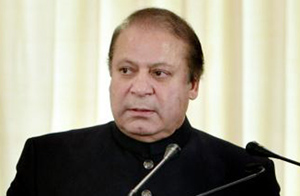Islamabad, Oct 10: Making a veiled reference to its nuclear capability, Pakistan today sought immediate defusing of tension at the LoC saying "both countries are aware of each other's capabilities" and war was not an option.
The Pakistani statement came after a meeting of the National Security Committee chaired by Prime Minister Nawaz Sharif which said its earnest desire for normalising bilateral relations and defusing the situation should not be taken as a sign of weakness.
Warning that any attempt to challenge its territorial integrity and sovereignty will be responded with full force, the meeting hoped that both countries would respect the ceasefire agreement of 2003 and maintain tranquility on the border.
Without using the word nuclear, the committee said both countries are aware of each other's capabilities and that war was not an option.
"It is the shared responsibility of the leadership of both countries to immediately defuse the situation," it said.
Briefing the media after the meeting, Interior Minister Chaudhry Nisar Ali Khan said Pakistan would not accept Indian "hegemony" on the border and was prepared to give a "befitting" reply to violation of ceasefire.
"The Committee expressed the resolve that any attempt to challenge Pakistan's territorial integrity and sovereignty will be responded with full force," the statement said.
The meeting was attended among others by select cabinet members, Chairman Joint Chiefs of Staff Committee, the three services chiefs and ISI chief.
"The Armed Forces assured the National Security Committee that they are fully prepared to deal with any adversity at our borders," said the NSC, the key consultative forum for civilian and military leaders to discuss security issues.
The meeting hoped that both countries would respect the "ceasefire agreement of 2003 and maintain tranquility on the LoC and the WB (working boundary), without indulging in blame-game and point-scoring."
India and Pakistan have been trading heavy mortar and gun fire along the international border and LoC since October 1.
While eight people died and 90 others, including 13 security men, were injured in the firing by Pakistani troops in Jammu and Kashmir, in Pakistan 13 civilians have been killed.
"Any further escalation will only complicate the environment for meaningful discussion on Kashmir issue and adversely affect the broader objective of regional cooperation," the committee said.
The Committee, however, made it clear that "Pakistan's earnest desire for normalising bilateral relations and defusing the situation at the LoC should not be seen as a sign of weakness. It is in fact a sign of maturity and sincerity.
The Committee expressed its disappointment that the "sincerity demonstrated by Pakistan has not been reciprocated".
"Abrupt cancellation of the Foreign Secretary-level talks by India and refusal to resume the dialogue process are a setback to our efforts to establish good neighbourly relations and present situation was a further blow to these efforts," it said.
The Committee noted that "these developments have not only disappointed the people in Pakistan and India but the international community too has shared this disappointment."
The Committee further noted with regret the "irresponsible" statements made at the political level in India, in the backdrop of the situation at the border.
It expressed deep concern that the "continuing ceasefire violations by Indian forces" had led to loss of precious lives and injuries to innocent people, including soldiers.
"Sadly, the unprovoked violations of ceasefire by the Indian Security Forces occurred in total disregard of the auspicious and festive occasion of Eid-ul Azha," it said.
The Committee expressed its full confidence in the capability of Armed Forces to defend the country against any aggression and safeguard the territorial integrity of Pakistan.
The Committee noted that the Government of Pakistan has pursued a policy of peaceful relations with all its neighbours.
"Initiation of peace dialogue of the 1990s, and more recently, participation of Prime Minister Nawaz Sharif in Indian Prime Minister Narendra Modi's oath-taking ceremony are a manifestation of Pakistan's sincere desire to constructively engage India to establish durable peace in the region," it said.
"We say yes to peace but no to hegemony," Khan said.
He said military officials had informed him that the India's Border Security Force had been using heavy ammunition, unlike previous instances of ceasefire violations.
Khan rejected Indian charge of Pakistan army starting the fight and said that Pakistan was already fighting a war on its western border against militants and had no reason to engage in this ‘adventurism'.
The interior minister said Pakistan Army is capable of fighting local and foreign enemies and will ensure the safety of the country.
"Kashmir is the reason for the dispute and recent escalation of border clashes,” Nisar said.
He promised to work for peace and said Pakistan has taken positive steps to improve relations with India, including Sharif's visit to New Delhi in May to attend his Indian counterpart Narendra Modi's swearing-in ceremony.
He said India instead of reciprocating the gesture of goodwill by Pakistan cancelled the foreign secretary-level bilateral talks on a baseless reason.
"Meeting with Hurriyat leaders is routine and not uncommon," Nisar said.
He said Advisor on Foreign Affairs Sartaj Aziz has been asked by Sharif to write a letter to the UN Secretary General Ban Ki-moon to highlight the ceasefire violations by India.
Khan said the Foreign Office will also brief the diplomats in Islamabad about the tension.
He said the official of UN observer mission in Pakistan will be taken to the border to help them ascertain who started the fighting.
Khan said firing by Indians seemed to have a specific purpose and asked India to realise that Pakistan was a nuclear power.
Earlier, the chief of army staff General Raheel Sharif, naval chief Admiral Zakullah and Advisor on Foreign Affairs Sartaj Aziz separately met with the prime minister and discussed matters pertaining to national security.
The NSC meeting was called after Sharif came under fire from Opposition leaders for not standing up to the alleged Indian "aggression" at the border.





Comments
Add new comment